|
|
|
 |
Main Features |
|
|

Compact physical size ideal for integration into ATE / Test Fixtures
• Programmer measures only 10.7 cm x 8.0 cm x 2.6 cm and has ergonomic design to supports the maximum packing density.
Gang ISP Programmer Configuration / network programming support
• Up to 32 programmers can be controlled from a single PC using the RS485 bus.
• Compact size and network option allows up to 32 programmers to be mounted even in small fixtures.
Wide ranging ISP Device Support capability
Supports In-System Programming (ISP) of many popular FLASH Microcontrollers, Serial EEPROM and serial FLASH Memories
High-speed ISP Programming
Optimised algorithms, on-board project data storage and high-speed line-driver circuitry delivers the fastest possible programming times
Supports most ISP Protocols
SPI, JTAG, JTAG Chain, I2C (2-wire), SCI, BDM, XMEGA PDI, ATtiny TPI
High-speed JTAG port
Supports high-speed JTAG programming of Atmel AVR, AT91SAM7 (ARM7), and XMEGA AVR microcontrollers
High-speed SPI port
Supports full range of SPI speeds from 10 Hz up to 4 MHz
High-speed XMEGA PDI port
Supports high-speed programming of Atmel ATxmega AVR microcontrollers via the 2-wire PDI Interface.
High-speed ATtiny TPI port
Supports high-speed programming of Atmel ATtiny AVR microcontrollers via the 2-wire TPI Interface.
Dedicated 2-wire I2C serial port with independent drive circuitry
Supports high-speed I2C programming of Serial EEPROMs, F-RAM memories and RTC ICs.
Fully ESD and Over-voltage protected I/O
All Target I/O pins feature both ESD and over-voltage protection.
Supports programming at Target Voltages down to 1.8V
An optimised driver circuit delivers fast clean programming waveforms from 1.8 to 5.0V.
Excellent Host Control connectivity
• 1 x High-speed USB Port
• 1 x RS232 Serial Port
• 1 x RS485 IN/OUT port – supports up to 32 programmers on an RS485 network
• 4-wire TTL Remote Control Port
• Remote Keypad / Display (ideal for standalone control in a Test Fixture)
Standalone Operation
• Programmer can operate in ‘Standalone Mode’ i.e. without PC Control.
• Programmer can be controlled via [START] button, 4-wire TTL Remote control Port, Target Detection or Lid switch detection control methods or Remote Keypad / Display.
Multiple Programmer Controlled Target Power Supplies
• Target Vcc Supply: 1.8 to 5.0V @ 300mA
• Target Vpp Supply: 6.5V to 13.5V @ 100mA
• External Vcc Voltage Supply (1.5V - 24.0V) switched to Target System
Programmer controlled Target Discharge Circuit
The programmer can automatically discharge any residual charge on the Target System to guarantee that the Target Vcc reaches 0V.
Simple ATE / Test Fixture Integration
Designed to interface to any ATE, ICT or Test Fixture
Special ATE version available with RELAY isolation (option)
All programmer ISP and power signals are galvanically isolated via relays.
Firmware upgradeable
New algorithms and features can be added via a simple firmware upgrade.
|
 |
Compact ergonomic enclosure |
|
|
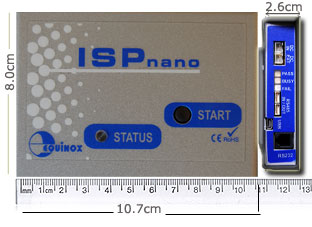
• Programmer measures only 10.7 cm x 8.0 cm x 2.6 cm
• Ergonomic design supports the maximum packing density of programmers
• Ideal for integrating multiple programmers into Test Fixtures for programming PCB Panels.
|
 |
Programmer – Target I/O Signals |
|
|
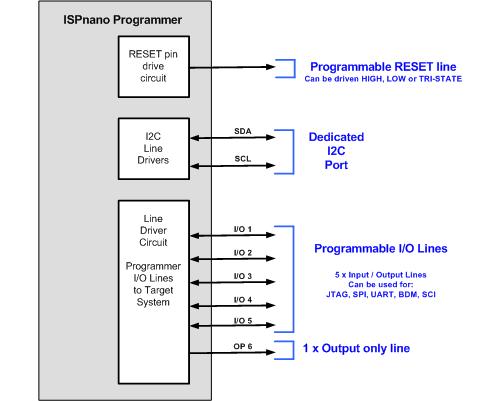
The ISPnano features the following programmable signal lines which interface the programmer and the Target IC(s) to be programmed on the Target System:
• 5 x Programmable Input / Output lines
• 1 x Programmable Output only line
• 1 x Dedicated I2C (Two Wire Interface) port
• 1 x Dedicated RESET pin with user-defineable push-pull control
• 1 x Programmable 32.771 kHz Oscillator Output for Oscillator Calibration on Programmer I/O1 pin
|
 |
Front Panel view |
|
|
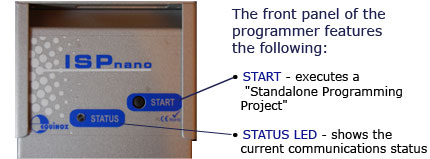
|
 |
Target Connectors |
|
|
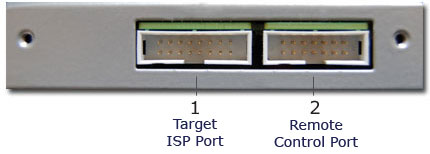
|
 |
Programmer Power and Communications Connectors |
|
|
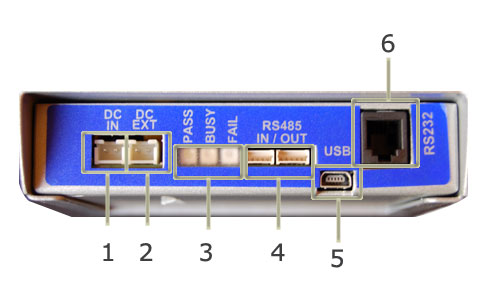
|
#
|
Connector Name
|
Description / comment
|
|
1 |
DC Power Input |
DC Power Input to power the programmer |
|
2 |
EXTERNAL TARGET VCC INPUT |
EXTERNAL TARGET VCC INPUT |
|
3 |
Programmer STATUS LEDs |
Programmer ‘Status’ LEDs |
|
4 |
RS485 Ports |
RS485 Ports (1) + (2) - Serial Communications Ports |
|
5 |
USB |
USB Port (mini-USB connector) |
|
6 |
RS232 Port (2)
or Remote Display Keypad |
RS232 Port (2) - Serial Communications Port |
|
 |
Programmer Power Supplies |
|
|
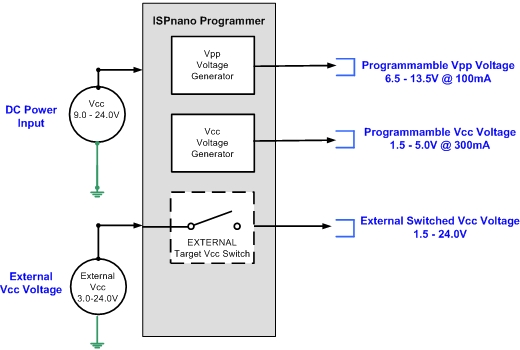
The ISPnano features the following on-board power supplies:
• 1 x Programmable Target Vcc Supply: 1.2 - 5.0V @ 300mA
• 1 x Programmable Target Vpp Supply: 5.8 - 13.5V @ 100mA
• 1 x External Vcc Voltage Supply (1.2V - 24.0V) switched to Target System
Power Supply features:
• Wide power supply input voltage range: 9.0V to 24.0V
• Short-circuit protected outputs
• Fast rise-time with enhanced current pumping capability to fast charge any capacitance on the Target System.
• Each power supply output (Vcc and Vpp) can be user-calibrated to a very accurate "spot voltage"
• Switchable Target Discharge Circuit - provides a fast discharge method for any capacitance on the Target System.
• Voltage measurement - supports measurement of Target Voltage, Line Driver Voltage and one External Voltage (1.2V - 30.0V)
• Current measurement - supports measurement of Target current on switch-on.
|
 |
Host Control connectivity (Communications Ports) |
|
|
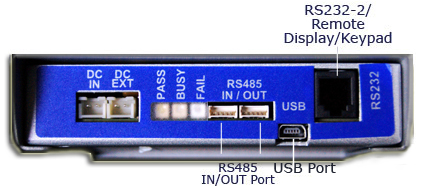
• 1 x High-speed USB Port (mini-USB connector)
• 1 x RS232 Serial Ports
• 1 x RS485 IN/OUT port – supports up to 32 programmers on an RS485 network
• 4-wire TTL Remote Control Port
• Remote Keypad / Display (ideal for standalone control in a Test Fixture)
|
 |
Gang ISP Programming / network programming support |
|
|
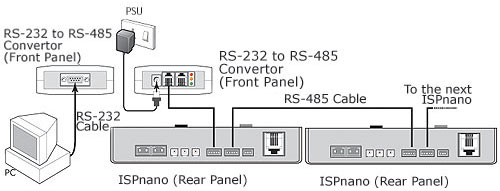
• Gang ISP Programming configuration is ideal for programming multiple PCB's on a 'PCB Panel'
• Up to 32 programmers can be controlled from a single PC using the RS485 Bus
• Compact size and network option allows up to 32 programmers to be mounted even in small fixtures.
|
 |
Standalone Programming Operation (no PC) |
|
|
The ISPnano programmer is capable of operating in ‘Standalone Mode’ i.e. without PC Control. In this mode a single 'Programming Project' or a set of 'Chained Projects' can be triggered using an external event. The programmer can be triggered to start a programming sequence using any of the following methods:
• [START] button on front panel
• 4-wire TTL Remote control Port (Ideal for ATE Remote Control)
• Target 'Load Sensing' Detection
• Test Fixture 'Lid Switch Sensing' (closes to start programming)
• Remote Keypad / Display mounted on the top of the Test Fixture
|
 |
Programmer Control Methods |
|
|

|
 |
Device Manufacturers Supported |
|
|
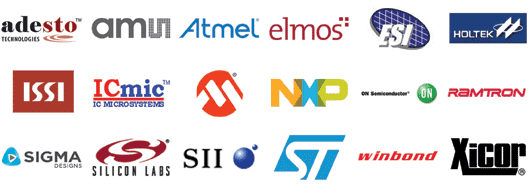
|
 |
Device Libraries |
|
|

To keep the overall system cost as low as possible, the ISPnano programmer does not come with any devices supported as standard. You can then simply purchase the 'Device Libraries' you need for your application from the list below.
Atmel
- AVR microcontroller SPI algorithms: AT90S, AT90CAN, AT90USB, ATtiny, ATmega
- AVR microcontroller JTAG algorithms: AT90CAN, AT90USB, ATmega
- AT89S 8051 SPI algorithms: AT89S51/52/2051/4051/8252/8253
- ATtiny AVR microcontroller TPI algorithms: ATtiny TPI
- AT91SAM7 ARM microcontroller JTAG algorithms: AT91SAM7S, AT91SAM7SE, AT91SAM7X, AT91SAM7XC, AT91SAM7L, AT91SAM7A
- ATXMEGA microcontroller PDI algorithms (Now available)
- AT45D Serial DataFLASH algorithms (now available)
NXP
- LPC 21xx ARM7 algorithms: LPC21xx
Zensys
- Zensys - Z-Wave: ZW0102, ZW0201, ZW0301
All manufacturers
- 24xxx Serial EEPROM algorithms (all manufacturers)
|
 |
How to change a programmer |
|
|
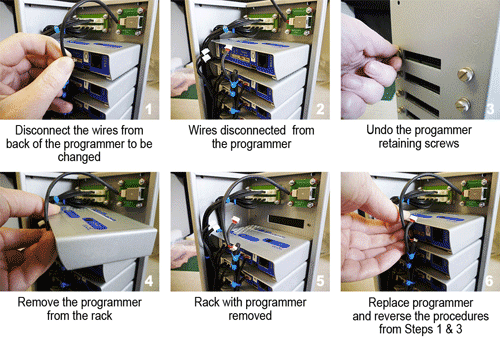
|
 |
Equinox Warranty for ISPnano Production Programmers |
|
|

|
| |